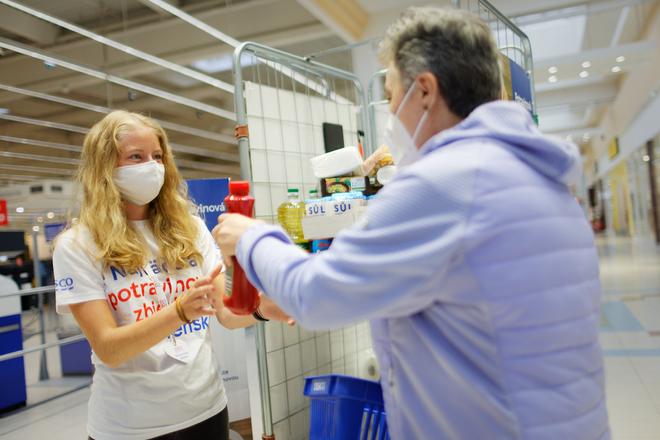Hospitals and healthcare facilities were not the only overwhelmed entities after the coronavirus pandemic broke out. People ran to the shops, buying products en masse, and shop assistants had to deal with many more customers than usual.
While other companies were closing, retailers were on the front line and recruiting new staff.
“Besides securing safer shopping and protecting customers’ health, we’re helping the most vulnerable people and people in need during the pandemic,” said Veronika Bush, head of communications at the Slovak branch of Tesco. The retailer is donating unsold food and organising food collections.
“We also gave fresh fruits and vegetables to medical staff in 60 hospitals and provided food gifts worth more than €220,000,” she added.
The retailer, active in Slovakia for 25 years already, realises it has a broader social responsibility.
“We believe that even a small act can have a bigger impact. Through small steps, we can make a big difference for our colleagues, customers and planet,” Bush said.
The company was awarded the Via Bona Slovakia award in the Responsible Large Corporation category by The Pontis Foundation, which recognises companies for their responsible and fair business practices.
More waste means more emissions
Tesco outlined its CSR and sustainability strategy in the Little Helps Plan document. It is based on four pillars – people, products, planet and places – and aims to contribute solutions to the most pressing social and environmental challenges.
It pledges to not throw away any food that is still edible. “Instead, Tesco helps people in need by donating unsold groceries,” Bush said.
If we do not change our behaviour, food will become the largest source of global emissions by 2030. Households, supermarkets and other food-selling shops dispose of up to 931 million tonnes of food every year; unused food contributes to 8 percent of global emissions.
Tesco has been fighting food waste since 2016 when it started measuring its food waste. A year later, it became the first retail store in central Europe to publish information about food waste. The retailer hopes it will serve as an inspiration to others.
Support for communities
In addition to protecting the environment and addressing climate change, the retailer wants to help its customers live healthier and sell them healthy and sustainable groceries. It has also been supporting local communities for 25 years.
One such project is titled “You decide, we help.” Launched in 2016, it lets customers decide which community project they want to support.
“A jury composed of Tesco and Pontis Foundation representatives selects the projects,” Bush said. The grant is open to non-governmental organisations, municipalities, kindergartens and primary schools, and other organisations.
The company most recently distributed nearly €170,000 in grant funds to projects.
“The interest is high, and the range of participating projects broad, which is very pleasing,” Bush said.
Author: Jana Hvozdovičová

 Tesco donates unsold food and organises food collections. (source: Courtesy of Tesco Stores SR)
Tesco donates unsold food and organises food collections. (source: Courtesy of Tesco Stores SR)